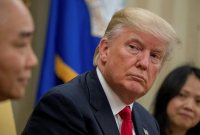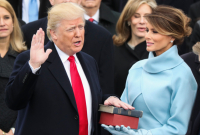Support strong Canadian climate journalism for 2025
One year ago, a Democratic hangout across the river from Washington, D.C., cleared out early as dejected partisans suffered one of the most devastating, demoralizing nights in the history of their party.
They enjoyed a tasty anniversary at that same barbecue joint.
Area Democrats crowded it for a celebration of electoral dominance in several state races Tuesday, high-fiving, hollering and hoping that, just maybe, the Donald Trump-era Republican party is eminently beatable.
''Best-case scenario,'' Justin Wilson said, grabbing a friend's hand.
Television screens overhead showed Democrats in Virginia coasting to their biggest gubernatorial victory in decades; in New Jersey seizing a governorship; and winning numerous legislative seats, with one especially poignant twist: Virginia elected the first-ever transgender woman to a U.S. state legislature, and she happened to dislodge a previously invincible social conservative who wrote the state's anti-transgender bill.
Last year lingers as a painful memory.
Wilson left Pork Barrel BBQ early last Nov. 8 to take in what happened, on his own, at home: ''It was a rough night,'' said Wilson, the vice-mayor of Alexandria. ''I've lost elections myself. (Trump's election) last year was worse... It was the pain you feel for the country. And the message it sent to my kids.''
His side couldn't beat Trump last year. But it rejoiced over the small blows dealt to Trumpism a year later, with results Tuesday that brought a sense of relief that the populist code might be crackable.
For the first time in a while, Democrats sounded confident.
Matt Bell ran 10 precincts Tuesday in Virginia and he couldn't believe the turnout. It's been almost three decades since Virginia state races hit 50 per cent turnout. Yet he saw a influx of people coming out in a cold driving rain, within the first minutes of polls opening in pro-Democrat areas near Washington.
''It was impressive. And it didn't let up... One guy told me, 'We’re coming out against Trump,'' he said.
''I think (Trump's success) was a one-off.''
Democrats were sounding so nervous just hours earlier. A creeping sense of deja vu was setting in.
Virginia in particular was cast a test case of the Trump model — with the idea that a Republican victory in this wealthy, purple, swing state might prove that the nationalist, populist, culture-warrior approach could win virtually everywhere in America.
The parallels were striking.
A wealthy, big-city Republican once again cast himself as a conservative culture-warrior. Well-connected Washington lobbyist Ed Gillespie ran racially tinged messages about protecting Confederate statues, expelling Latino criminals, and football players not kneeling for the national anthem.
Democrats entered the race with a considerable lead — but like last year, the polls tightened in the final days.
Their message of economic-opportunity-for-all was swamped in sociological polemics. There was also fear of an enthusiasm gap on the left. Northam, a former army doctor who twice voted for George W. Bush, was scorned by some progressives. Morale wasn't helped by a new book that reawakened bitter memories from Wikileaks: the party's ex-chair wrote that Sen. Bernie Sanders was cheated in last year's primary.
By late Tuesday, it was Republicans doing the second-guessing.
Anti-Trump Republican John Weaver, a former campaign aide to John Kasich, tweeted: ''GOP, you're seeing the future.'' A like-minded colleague Rick Wilson tweeted his oft-repeated maxim: ''Everything Trump touches dies.''
The president was suddenly blaming the Virginia candidate — for not embracing him enough. This was an abrupt turn from earlier in the day, when Trump's Twitter feed was filled with get-out-the-vote message for Gillespie.
An area political scientist says it's probably wrong to treat this race between Northam and Gillespie as some kind of 2016 rematch holding great meaning about the imminent fate of American politics, since a whole bunch of other factors are at play, including 100 state legislative races happening simultaneously.
But people will do it anyway.
''The national media have tended to make this a referendum — a kind of Trump-Clinton redux: Here we are a year later,'' said Lauren Bell of Randolph-Macon College in Ashland, Va.
''(If Republicans had won) the national takeaway (was) going to be that Trump was not a one-off. That he's not some cult-of-personality. That the way Republicans can win is by ... appealing to white voters' fears of a changing society... The story (would) be, 'This is how Republican candidates can win.'''
At an event in Washington, D.C., a few days ago, former Barack Obama White House staffers expressed fear of a loss — and of its potential implications. If the racial-messaging tack were to prove successful in Virginia, they predicted it would alter the Republican party.
If it worked in a state with a thriving economy, a 3.7 per cent unemployment rate, a popular outgoing Democratic governor and a record of voting for Hillary Clinton last year, it would embolden Republicans to play the race card elsewhere.
''It has national implications,'' said Jon Lovett, a former Obama staffer
Mid-cycle races matter for other reasons.
Poor results in 2013 races proved a harbinger of electoral doom ahead for Democrats — the party went on to lose both chambers of Congress, a century-old record 34 governorships, and the presidency.
But there are new slivers of light emerging for them.
University of Virginia political scientists have calculated that, even before Tuesday, Democrats had outperformed Hillary Clinton’s 2016 margin in recent open-seat elections with an average gain of 11 percentage points.
That kind of surge, if sustained, could flip control of the U.S. House of Representatives next year.





Comments